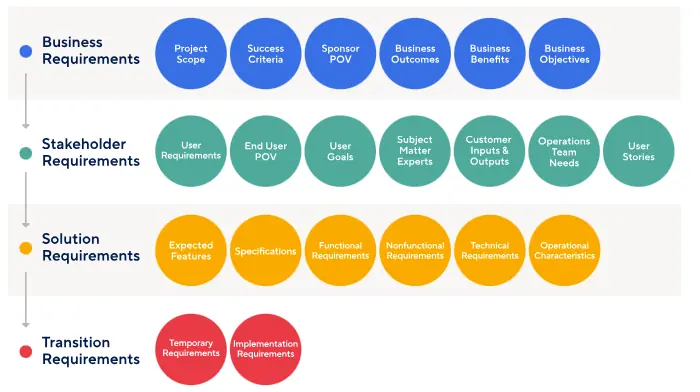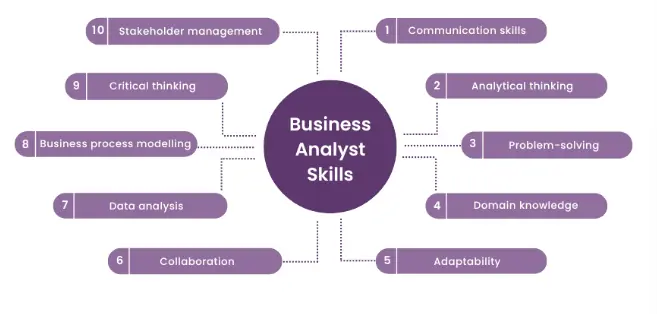Role of a Business Analyst in an IT Industry

In the context that Information Technology (IT) is growing tremendously, Business Analyst takes the important role of filling the gap between IT and business through a combination of data analysis, specific knowledge of industries, and technique to evaluate processes. Their main aim is to put in place the best solutions that will suit the objective or goals of the business.
BAs stand on the front lines of IT projects ensuring that they are in line with organizational aspirations and provide a tangible upside. Here in this blog we’ll explore the deep meaning of a Business Analyst which is very important in the IT field and we’ll throw light on the skills and responsibilities that distinguish this crucial position.
What Does an IT Business Analyst Do?
A business analyst gets to the core of the business and exposes problems and inefficiencies. Apart from effective analytical skills, communication, and requirement documentation, they translate their findings into detailed action plans which developers can easily implement and work with them to develop and implement solutions that perfectly address the company’s needs. Through their role of aligning IT projects with organizational strategies, business analysts are the secret weapon that concurs with efficiency and brings success.

Roles and Responsibilities of a business analyst
Understanding Business Needs
Business analysts dive into the business space to capture any existing organization’s strategic goals, weaknesses, and problems. This calls for conducting meetings with the stakeholders, exploring processes, and building up the technology needed to enhance the systems.
Requirement Elicitation
It’s the crucial first step, drawing out the needs of stakeholders like unspoken knowledge. Business analysts act as detectives, gathering this vital data through interviews and research. It’s complex, but sets the foundation for budget, timeline, and project scope by ensuring everyone is on the same page.
Documentation Management
BAs precisely define requirements, functional specifications, use cases, and other features with the help of the previously known techniques. Documentation that is brief, easy to understand, and in tune with the dynamics of the project helps the development team to get a better handle on it and control change over the lifecycle of the project.
Validating Delivered Requirements
Making sure that the provided requirements are valid is an important business analysts duty by checking that the solutions meet with stakeholder intent and operative purpose. It includes evaluation of correctness, completeness and consistency of requirements to prevent error during implementation. Business Analysts measure feasibility and test practical options. We ensure that proposed systems meet user requirements with desired results. Fundamentally, this validation phase improves the quality of the model, reduces the risks, and leads to a high level of project success.
Solution Design and Validation
Business Analysts work in close partnership with the technology team and tend to design solutions that meet core business demands. They offer the alternatives to prove the proposed solution by way of modeling, feedback from the end users, and iterative reviews to match the requirements.
Risk Assessment
They identify risks in advance of Implementation of a project and facilitate a collaborative process with stakeholders that involves the development of risk mitigation strategies that lower the frequency of project related disruptions.
Management and Testing
They often deal with overviewing tasks, which include making sure that things always stay within their scope and timeline. They may also do the System Testing stage to be certain that the solution is consistent with the defined requirements.

Importance of Business analyst in IT
Enhanced Effectiveness and Performance
By recognizing the areas in which progress can be made and by applying the right technological solutions, the companies use the technology in an indicated manner for their business efficiency and productivity.
Critical Thinking
They are a strong demonstration of the ability to enumerate complex problems, draw conclusions from the information and name the most appropriate decision.
Expense Reduction
They often perform in-depth analysis such as requirements gathering to assist in avoiding expensive mistakes, hence business will be able to achieve more to the extent of realizing and implementing strategic goals through proper technological investment.
Communication
Communication is the key for a better understanding of the process as they convey the technical terms to the non-tech parties and vice versa to gain clear concept of the process and requirements
Elevated User Satisfaction
The business analysts fulfill a dual role of business user’s representative, and make sure that developed applications are easily navigable and users’ feedback is incorporated.
Industry Expertise
An applicative knowledge of both business processes and IT systems ensures that Business Analysts can express themselves in the language of both worlds and can bring them together at the best.

Conclusion
With technology being central towards the survival and growth of businesses in the future, the role of the Business Analyst in an IT Industry will continue to be pivotal when it comes to shaping that future of information technology. Business analyst work as mediators, or interpreters, clarifying business requirements and rewarding them into tasks that the programmers can work on which helps in delivering to the real value that the project should bring. Requirement gathering, risk mitigation, and communication is in their area of expertise and that is why projects are progressing on time without any delays. After all, Business Analyst are the hidden actors of success, building the operations, and the framework necessary to smoothly bring ideas to life and business into the future.





